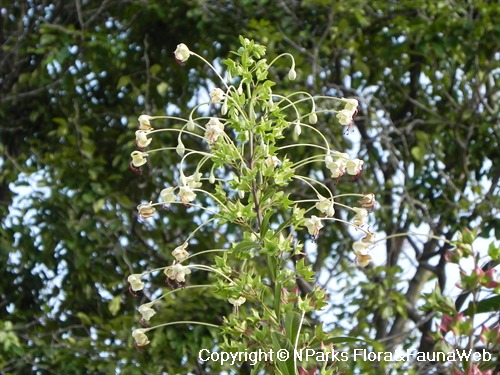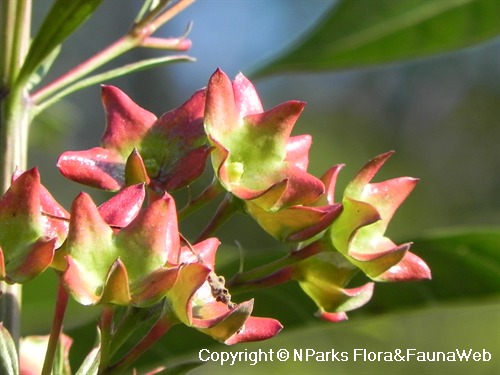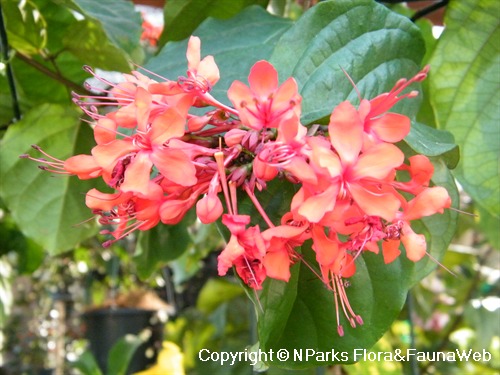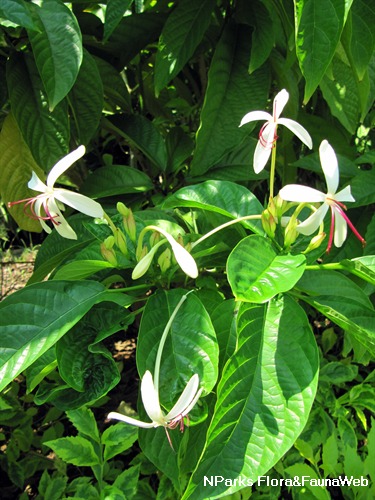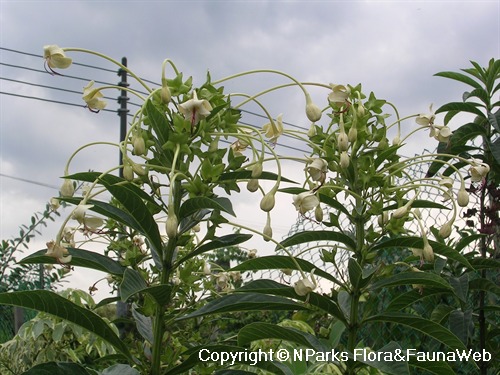
Back
Clerodendrum indicum (L.) Kuntze
| Family Name: | Lamiaceae (Labiatae) |
| Common Name: | Turks Turban, Tube Flower, Skyrocket, Champagne Clerodenrum, Clerodendron |
Name
Classifications and Characteristics
| Plant Growth Form | Shrub |
|---|---|
| Lifespan (in Singapore) | Perennial |
| Mode of Nutrition | Autotrophic |
| Maximum Height | 1.8 m to 2.7 m |
Biogeography
| Native Distribution | Indonesia, India, Myanmar |
|---|
Description and Ethnobotany
| Growth Form | Semideciduous perennial or semiwoody shrub that grows up to 2.7 m tall. |
|---|---|
| Foliage | Elliptic leaves are whorled with 4 leaves per node and attached by short petioles (15 - 20 cm long, 5 - 8 cm wide). Leaf margin is dentate (toothed). |
| Stems | Stem is hollow, straight or bent, and mostly unbranched. |
| Flowers | White to cream, tubular flowers hang downwards (10 cm long, 5 cm wide). The calyx (outermost layer of the flower) expands to form a fleshy, star-shaped structure that surrounds the fruit. Flowers are arranged in a large, branched inflorescence known as a panicle (up to 0.6 m long). |
| Fruit | Fleshy, pitted fruits are known as drupes (1.2 cm wide). Round, shiny blue fruits are surrounded by a fleshy calyx (the outermost layer of a flower) that is star-shaped and red-orange. Fruits are typically produced during the wet season. |
| Associated Fauna | This species is a butterfly nectar plant. |
| Cultivation | This species should be grown in fertile, well-drained soil that is kept moist. Its growth may need to be restrained, because it can spread quickly through suckering and self-seeding, |
| Etymology | The genus "Clerodendrum" comes from the Greek word "dendron" which means tree. The species epithet "indicum" means that it is from India. |
| Ethnobotanical Uses | Medicinal: In Java, dried leaves are rolled into cigarettes and smoked to relieve asthma. In India, plant juice is applied externally to treat skin problems. In Myanmar, resin is used to treat rheumatism. In New Caledonia, leaves are used as a tonic and medicine. |
Landscaping Features
| Desirable Plant Features | Ornamental Flowers |
|---|---|
| Landscape Uses | Flowerbed / Border |
| Thematic Landscaping | Butterfly Garden |
Fauna, Pollination and Dispersal
| Fauna Pollination Dispersal Associated Fauna | Butterfly-Attracting (Flower Nectar) |
|---|
Plant Care and Propagation
| Light Preference | Semi-Shade, Full Sun |
|---|---|
| Water Preference | Lots of Water |
| Rootzone Tolerance | Moist Soils, Well-Drained Soils, Fertile Loamy Soils |
Foliar
| Mature Foliage Colour(s) | Green |
|---|---|
| Foliar Shape(s) | Non-Palm Foliage |
| Leaf Area Index (LAI) for Green Plot Ratio | 4.5 (Shrub & Groundcover - Dicot) |
Floral (Angiosperm)
| Flower Colour(s) | White |
|---|
Fruit, Seed and Spore
| Mature Fruit Colour(s) | Blue |
|---|---|
| Mature Fruit Texture(s) | Smooth, Glossy / Shiny |
Image Repository
Others
| Master ID | 526 |
|---|---|
| Species ID | 1822 |
| Flora Disclaimer | The information in this website has been compiled from reliable sources, such as reference works on medicinal plants. It is not a substitute for medical advice or treatment and NParks does not purport to provide any medical advice. Readers should always consult his/her physician before using or consuming a plant for medicinal purposes. |



